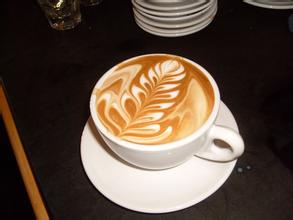Introduction to the flavor and taste characteristics of Panamanian jadeite manor coffee with emphasis on bright and lively acidity
Panama is located on the Panamanian isthmus in Central America, bounded by Colombia to the east and the Pacific Ocean to the south.
Map of Panama
Map of Panama
It is bordered by Costa Rica to the west and the Caribbean to the north. The territory is S-shaped to connect North and South America, and the Panama Canal connects the Atlantic and Pacific oceans from north to south. It is known as the "bridge of the world". [5] Panama has a land area of 75517 square kilometers, a land length of 772km and a width of between 60km and 177km. The coastline is 2988 kilometers long and the land boundary is 555 kilometers long. In longitude and latitude, Panama is located between 7 °N and 10 °N, and between 77 °and 83 °W. The national emblem of Panama was launched in 1904. The national emblem is a brown eagle with its head held high.
Panamanian national emblem
Panamanian national emblem
It stands on the national emblem with a white ribbon with the Panamanian motto "for the benefit of the world". In the middle of the national emblem is the brown isthmus of Panama, the blue Pacific and Caribbean seas, and the Panama Canal that connects them; under the blue sky, a bright moon has risen, the corresponding sunset is still shining in all directions, symbolizing the arrival of Panama's independence "at sunset and moonrise"; the silver sword and rifle crossed on the upper left have experienced the ups and downs of hundreds of years of war on Panamanian land. The T-pick and shovel on the upper right represent the country's call for active construction and hard work; the sheep's horn overflowing with gold coins and the golden two-winged flywheel symbolize the progress and prosperity of the country. The four national flags are decorated around the national emblem, and the top nine golden five-pointed stars represent the nine provinces of Panama. The current government of Panama was formed on July 1, 2009. the main members are: vice President Juan Carlos Varela, Minister of the Presidential Office Jimmy Papadimitriu, Foreign Minister Fernando Nunez Favre, State Interior Minister Jorge Ricardo Favre Minister of Public Security Jose Raul Mulino, Minister of economy and Finance Frank George de Lima, Minister of Commerce and Industry Ricardo Quijano, Minister of Agriculture and Animal Husbandry Development Oscar Armando Osorio Kassar, Minister of Health Javier Diaz, Minister of Housing Yasmina Pimentel (female), Minister of Labour Armah Lorena Cortez (female) Guillermo Ferrufino, Minister of Social Development, Lucy Molina, Minister of Education (female), Minister of Public works, Jaime Ford, Minister of small and medium Enterprises (female), Minister of Canal Robert Roy, Minister of Tourism Salomon Sama
In the Pokuit producing area, there are also many excellent manors, except the famous Emerald Manor, Alida Manor, Aqaba Manor and so on, all of which produce high-quality boutique coffee. This is not only due to the superior ecological conditions of the Pokuit region of Panama and the fertile volcanic ash soil of the Baru volcanic land. Another important factor is that the microclimate in the Poquet Heights of Panama is a unique and important resource for boutique coffee in the Pokuit region. This is the Panamanian environment from east to west that allows cold air to converge above 6500 feet through the Central Mountains, thus creating a variety of microclimates in the Pokuit region, making its temperature and rainfall very suitable for plant growth. so the coffee trees grown here grow very well.
In Poquet's unique planting environment, there is naturally not only the rose summer of emerald, the king of coffee, regardless of flavor, quality and value, but I think it is quite extravagant to drink rose summer every day, and even if there is no economic pressure, it is not like eating shark's fin and bear's paw every day. The same is true of coffee. Only if you dabble widely can you enjoy the taste of coffee. Panama belongs to Central American countries, bordering Costa Rica to the west and Colombia to the east. Anyone who knows anything about individual coffee should know that Panamanian coffee is famous in the coffee world as the geisha Geisha (the name of Rosa) in the Emerald Manor. It can be said that it is a country that strives for the excellence of coffee and is rich in high-quality coffee. Panamanian coffee is famous for the rosy summer of the jadeite estate, which is also quite famous; it is located in the Boquete producing area of Chiriqui province. Boquete is a town of Chiriqui in the province of Ricki, located near the border between Panama and Costa Rica, close to the famous Baru Baru volcano, scenic, fertile soil, climate and soil are very suitable for producing quality coffee so there is a very cost-effective bean in the land of Poquette. And it has a very beautiful name-Flower Butterfly. She has 40% high-quality Rosa pedigree, which is composed of Rosa, Kaddura and Kaduai. It is planted in the Baru volcano region of Pokut and grows in the volcanic area at an altitude of 1600 meters. The treatment plant uses fine washing treatment. Panama's special local microclimate leads to abundant rainfall in this area, and a large temperature difference between day and night, coupled with the unique volcanic rock and soil of the volcanic area, as well as meticulous harvesting and fine treatment. It makes this coffee perform well in terms of firmness, acidity and floral aroma.

Important Notice :
前街咖啡 FrontStreet Coffee has moved to new addredd:
FrontStreet Coffee Address: 315,Donghua East Road,GuangZhou
Tel:020 38364473
- Prev

Introduction of Coffee Flavor producing area of Kimmel Manor in Rwanda with clean taste and high alcohol thickness
Rwanda is located in the south of the equator in east-central Africa, a landlocked country. It is bordered by Tanzania to the east, Burundi to the south, Zaire to the west and northwest, and Uganda to the north, with a land area of 26338 square kilometers, ranking 149th among all countries in the world and close to Burundi, Macedonia, Haiti and Albania. Rwanda is located in east-central Africa, bordered by the Democratic Republic of the Congo to the west.
- Next

Introduction to the characteristics of coffee flavor and taste production area of Santa Cruz Manor in Ecuador, which is suitable for various uses.
The national emblem of Ecuador was launched in 1900, which is similar to the national emblem of Colombia. A ferocious American condor vulture spreads its wings above the national emblem. It is the national bird of Ecuador, symbolizing sovereignty and independence. The design of Ecuador's national emblem is unique, which fully shows the amorous feelings of the country: Mount Chimborazo, Ecuador's highest peak, is covered with snow and stands towering against the blue sky.
Related
- Does Rose Summer choose Blue, Green or Red? Detailed explanation of Rose Summer Coffee plots and Classification in Panamanian Jade Manor
- What is the difference between the origin, producing area, processing plant, cooperative and manor of coffee beans?
- How fine does the espresso powder fit? how to grind the espresso?
- Sca coffee roasting degree color card coffee roasting degree 8 roasting color values what do you mean?
- The practice of lattes: how to make lattes at home
- Introduction to Indonesian Fine Coffee beans-- Java Coffee producing area of Indonesian Arabica Coffee
- How much will the flavor of light and medium roasted rose summer be expressed? What baking level is rose summer suitable for?
- Introduction to the characteristics of washing, sun-drying or wet-planing coffee commonly used in Mantenin, Indonesia
- Price characteristics of Arabica Coffee Bean Starbucks introduction to Manning Coffee Bean Taste producing area Variety Manor
- What is the authentic Yega flavor? What are the flavor characteristics of the really excellent Yejasuffi coffee beans?

